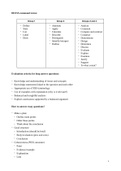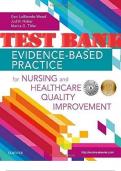Samenvatting
Summary Oxford IB Diploma Programme: Environmental Systems and Societies Course Companion, ISBN: 9780198332572 Environmental systems
- Vak
- Instelling
- Boek
This is a study guide for the IB ESS course. It includes a guide for answering different types of questions, as well as relevant case studies. I obtained excellent results in the IB exams using solely this study guide and doing practice excersises.
[Meer zien]













